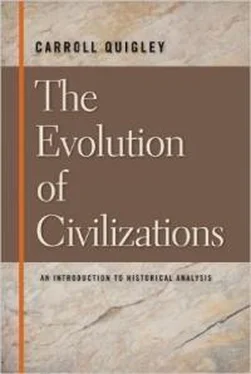After centuries of expansion our society is now organized so that it cannot subsist; it must expand or it will collapse. This relationship might be expressed in the rule that, unless savings are invested in producers' goods, there will not be sufficient purchasing power to buy the consumers' goods that are being produced. Of course, as this problem has become increasingly acute in the contemporary period, a third factor has intervened: government spending. Such government spending provides purchasing power just as investment does. When the factors of production are mobilized at government cost to make a nuclear submarine, the community obtains incomes available as purchasing power, and no subsequent claim on this purchasing power is made by government action, since the submarine is not offered for sale. Of course, insofar as this government spending is covered by taxes levied on consumers' purchasing power there is no net increase in such purchasing power; but a considerable part of government spending is covered by taxes on savings (and thus operates like investment) or is not covered by taxes at all (and thus represents a net increase in purchasing power, an inflationary increase when savings are being invested fully).
This rather complicated example of how an expanding society can become so organized for expansion that it enters upon an acute crisis if the expansion rate decreases is worth analyzing, because somewhat similar crises occur in all civilizations when the rate of expansion decreases. And such decrease is the chief result of the institutionalization of the instrument of expansion, something that occurs in every civilization. We shall see many examples of this and of the varied ways this process occurs when we make a more detailed analysis of the evolution of various civilizations.
Our tentative definition of a civilization was "a producing society that has writing and city life." This definition is imperfect because it is descriptive rather than analytical; it is also imperfect because it is not completely true. Western civilization about A.D. 970 had almost no city life, but still was a stage in a civilization. And Andean civilization, even under the Inca Empire, had no writing, but clearly was a civilization. It is now possible to offer a better, if not perfect, definition of a civilization: "a producing society with an instrument of expansion."
Before we go on to examine the consequences when an instrument of expansion becomes an institution, we might point out that the surplus-creating organization that is such an essential part of any instrument of expansion does not need to be the only surplus-creating organization in the society. In all societies there are other, less significant, surplus-creating organizations than the one we have considered part of the instrument of expansion. In Mesopotamian civilization the significant surpluses were accumulated by the Sumerian priesthood from tithes and its own profits, but there can be no doubt that private persons were accumulating surpluses from profits of private enterprise or from the earnings of privately owned slaves or even from voluntary restrictions on their own consumption. These kinds of surplus accumulation may be found in any civilization no matter what preponderance may exist for its "own" instrument of expansion. In 1850, when Western civilization was most completely organized on the basis of private profit, surplus was undoubtedly being accumulated, and invested, from government taxes or from private slavery. And we would not be surprised if the most socialistic civilizations, like the Andean under the Incas or the Russian under the Soviets, had a certain amount of private accumulation from profits.
These variant and incidental types of surplus accumulation are usually of little significance in a civilization, not only for their relatively small volume of savings but even more because they are not usually expended in productive investment but rather are likely to end up in luxury expenditures and are, thus, little more than postponed or transferred consumption. In theory, however, it must be admitted that our statement that "every civilization has an instrument of expansion" could well be understood to mean that a civilization has at least one such instrument. Except for one dubious case, we do not know of any civilization, in its prime of life, that has had more than one significant surplus-creating organization.
We have said that an instrument of expansion, like all instruments, becomes an institution and that as a result the rate of expansion begins to decline. This institutionalization of the organization of expansion, which usually takes the form of a decreasing rate of investment (rather than of a decrease in either invention or in accumulation of surplus), leads to a crisis. This crisis, which we have called increasing tension of evolution, arises from the clash between the decreasing rate of expansion, on one hand, and the fact that people's minds and the organization of the society are arranged for expansion, on the other hand. Reserving until later our detailed examination of the forms this crisis takes, we might point out here that it usually gives rise to conflicts between the vested-interest groups that control the uninvested accumulations of surplus (because they control the surplus-creating organization in the society) and are sufficiently satisfied with the existing social organization to desire no change and the great mass of the population who are discontented at the dwindling prospects of expansion.
The growing tension of evolution and the clashes it engenders can result in one of the three possible outcomes to the crisis. These are (1) reform, (2) circumvention, or (3) reaction. We speak of reformwhen the organization of expansion is rearranged so that it ceases to be an institution and becomes an instrument once more. We speak of circumventionwhen the vested-interest groups are left with much of their privileges intact and when a new instrument of expansion (especially a new surplus-accumulating instrument) grows up alongside the older institution and takes over the latter's expansive functions. We speak of reactionwhen the privileged vested-interest groups are able to prevent either reform or circumvention and, in consequence, the rate of expansion continues to decrease. If the outcome is reform or circumvention, the civilization once again has an instrument of expansion and the rate of expansion increases once again. If the outcome is reaction, the decline becomes chronic. There have been several cases where a civilization has succeeded in obtaining reform or circumvention of its institution of expansion, as we shall see in our detailed examination of the process of evolution in individual civilizations. The clearest case to be found is the evolution of our Western civilization, where both circumvention and reform have occurred. As a result, Western civilization has had three periods of expansion, the first about 970-1270, the second about 1420-1650, and the third about 1725-1929. The instrument of expansion in the first was feudalism, which became institutionalized into chivalry. This was circumvented by a new instrument of expansion that we might call commercial capitalism. When this organization became institutionalized into mercantilism, it was reformed into industrial capitalism, which became the instrument of expansion of the third age of expansion in the history of Western civilization. By 1930 this organization had become institutionalized into monopoly capitalism, and the society was, for the third time, in a major era of crisis. A detailed analysis of these changes will be provided later.
The process that we have described, which we shall call the institutionalization of an instrument of expansion, will help us to understand why civilizations rise and fall. By a close examination of this process, it becomes possible to divide the history of any civilization into successive stages. We have said that these divisions are largely arbitrary and subjective and could be made in any convenient number of stages. We shall divide the process into seven stages, since this permits us to relate our divisions conveniently to the process of rise and fall. These seven stages we shall name as follows:
Читать дальше










